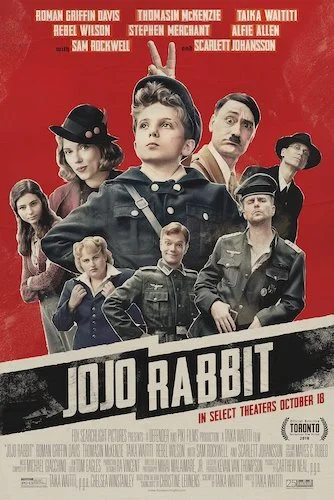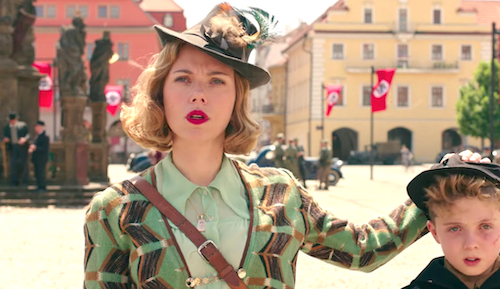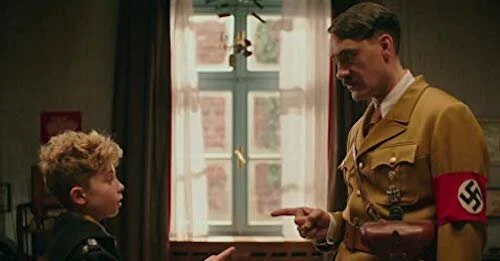Jojo Rabbit
Editor’s Warning: This is a review of a film shown at the Toronto International Film Festival. There is a chance that this film will not be accessible for a specific period of time, depending on the film’s release date. Be aware that there may be slight spoilers. Proceed at your own discretion.
Somehow, Taika Waititi's self proclaimed anti-hate satire Jojo Rabbit won the Grolsch People’s Choice Award at the Toronto International Film Festival. That means the awards season officially starts. This award is basically an America's-Got-Talent golden buzzer straight into the Academy Awards (usually a guarantee for the Best Picture category). Sometimes these picks actually win. American Beauty. Slumdog Millionaire. 12 Years a Slave. Even the divided Green Book got its start once it was selected by the Toronto public.
My surprise comes from the split reception Jojo Rabbit has been receiving. I left my theatre feeling quite pleased with the film; not perfect, but definitely a piece I am glad I got to witness. The patron beside me exclaimed "I thought that was awful". That is why I am shocked that this peculiar film won the award. This award is all about audience participation. Many people loved Jojo Rabbit, but just as many people hated it. Who knows how this film won. All I know is that the various academies that select their nominees for the 2020 season now have to jump on board and see what all the hubbub is about. Half of the members will love it. Half will hate it. You can see where this is going. Essentially, Jojo Rabbit's course is set to at least be analyzed, thus ensuring that enough people will push it through to the very end.
Jojo converses with his buffoonish imaginary depiction of Adolf Hitler, who replaces his missing father figure.
Why is that, exactly? As someone who loves satires more than most film genres, Jojo Rabbit was much more of a hand hold than a slap across the face. The commentary was hardly savage. Then again, do we need to be told how to feel about Nazis? Waititi’s signature warmth allows Jojo Rabbit to feel tangible, beyond the cold distance of your common satire. One good thing is I didn’t feel as though this film went full on Life is Beautiful, which relied entirely on kitsch or the pulling of heart strings. Jojo is a Hitler youth recruit driven by hatred: the Jewish community is despicable in his eyes. He’s not a bad kid, but he’s been misled to be something he’s far from. Early on, many other youths or adults poke at Jojo, as if he isn’t cut out to be a Hitler youth (which he simply isn’t). No matter. Jojo feels as though Adolf Hitler can replace his missing father, and he is a part of something great. So he strives on, with the best intentions.
That asset alone separates this film from Life is Beautiful. We start in a completely different place. We’re smack bang in the middle of World War II, we’re witnessing moronic Nazis as thin as a cardboard cutout in character, and everything is dazzled up Wes Anderson style. We’re already in the thick of things, and we understand that we’re seeing this through Jojo’s eyes. One of the German Beatles cuts is used in the intro credits, set to images of Hitler parades (reminding us of the complete fanaticism Hitler followers exuded). I feel most of the darker turns in Jojo Rabbit are genuine. You see where they come from, what they add to the film, and it all checks out. The ending, while well intentioned and sensical on paper, is maybe less bombastic than I would have liked (outside of, well, that moment which usually results in a wild audience reaction, of course). Aside from that, Jojo Rabbit is receptive, but it doesn’t always feel too safe or sterile.
Jojo and his mother strolling the streets together.
The film is held together by strong performances, ranging from the commanding (Roman Griffin Davis as the lead child role), the hilarious (Rebel Wilson as the worst of Nazi stereotypes, but who the hell cares at this point, especially when she’s a riot), the magnetic (Thomasin McKenzie), and the mixture of all of the above (Scarlett Johansson). Waititi as Hitler is also something else. Somehow, we find his character monstrous, and his cartoonish actions hilarious. Waititi pulled off the great caricature: funny enough to need, and disgusting enough to not like. There are enough narrative turns to keep you invested throughout, as well.
The imaginary Hitler works as Jojo’s brainwashed conscience, that gets more and more menacing the further Jojo strays away.
Despite the split audience reception, it all makes sense as to how Jojo Rabbit won the poll based award. It’s most certainly a crowd pleaser. It goes dark enough comedically to satisfy the edgiest of us, but it knows when to retreat. It’s soft enough to convince the wary that this premise is meant to work. While not too cautious, the slightest hints of extra oomph would have sent the film into a whole different echelon. I shouldn’t complain too much. This is a dark comedy interwoven with dramatic elements, about a German kid whose best friend is an apparition of Adolf freaking Hitler. I’m surprised the film worked out as well as it did. How much further could it go, before it turns into either an exploitation Nazi comedy, or the sappiest film of the year? Jojo Rabbit is slightly restrained, but given what it’s pulled off, I don’t really mind all that much. Neither did most TIFF participants, evidently.
Jojo Rabbit is an anti-hate satire, because it allows the hyperbolic characters to do their thing, the messages to hit, and the style to compliment and expose; all is sewn together with heart, to try and drive hate into the ground. Whether it succeeds or not for you, you can at least say no one is as nuts as Taika Waititi, who not only made a dark comedy featuring Hitler, but even went as far to tame it.
Andreas Babiolakis has a Masters degree in Film and Photography Preservation and Collections management from Ryerson University, as well as a Bachelors degree in Cinema Studies from York University. His favourite times of year are the Criterion Collection flash sales and the annual Toronto International Film Festival.







